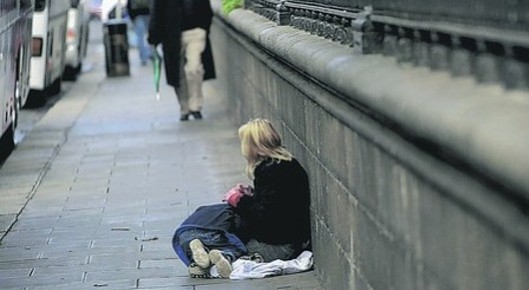
Calls for a ‘commission of inquiry’ into the impact of the government’s changes to social security entitlements on poverty have won overwhelming support from Parliament.
The motion by Labour’s Michael Meacher was passed with a massive majority of 123 votes; only two people – David Nuttall and Jacob Rees-Mogg – voted against it.
The debate enjoyed cross-party support, having been secured by Mr Meacher with Sir Peter Bottomley (Conservative) and John Hemming (Liberal Democrat).
Introducing the motion, Mr Meacher said: “It is clear that something terrible is happening across the face of Britain. We are seeing the return of absolute poverty, which has not existed in this country since the Victorian age more than a century ago. Absolute poverty is when people do not have the money to pay for even their most basic needs.”
He said the evidence was all around:
- There are at least 345 food banks and, according to the Trussell Trust, emergency food aid was given to 350,000 households for at least three days in the last year.
- The Red Cross is setting up centres to help the destitute, just as it does in developing countries.
- Even in prosperous areas like London, more than a quarter of the population is living in poverty.
- According to the Joseph Rowntree Foundation, for the first time, the number of people in working families who are living in poverty, at 6.7 million, is greater than the number of people in workless and retired families who are living in poverty, at 6.3 million.
- Child poverty will rise from 2.5 million to 3.2 million during this Parliament, around 24 per cent of children in the UK. By 2020, if the rise is not stopped, it will increase to four million – around 30 per cent of children in the UK.
- The use of sanctions depriving people of all their benefits for several weeks at a time, had increased by 126 per cent since 2010 and 120 disabled people who had been receiving jobseeker’s allowance had been given a three-year fixed duration sanction in the previous year.
- There are now more than 2,000 families who have been placed in emergency bed-and-breakfast accommodation after losing their homes.
- The per cent rise in the overall homelessness figures last year included nearly 9,000 families with children, which is the equivalent of one family losing their home every 15 minutes.
- A third of families spent less than £20 a week on food and that the average spend on food per person per day was precisely £2.10. That is a third less than those families were able to afford three months before that.
- The proportion of households that had to make debt repayments of more than £40 a week had doubled and the average level of debt was £2,250.
- A third of families had council tax debt.
- 2.7 million people had lost out through the Government’s changes to council tax benefit – many of them disabled people, veterans and some of the most vulnerable in our communities.
- Households were having to spend 16 per cent more on gas and electricity.
- There are 2.5 million people who have been unemployed for the best part of two years, and there were 562,000 vacancies when the debate took place (Monday), so four out of five of those who are unemployed simply cannot get a job whatever they do.
- Cuts to local authorities mean many home care visits are limited to 15 minutes.
- The 10 per cent of local authorities that are the most deprived in the country face cuts six times higher than those faced by the 10 per cent that are the most affluent.
- 60 per cent of benefit cuts fall on those who are in work.
Mr Meacher said the biggest cause of absolute poverty was the huge rise in sanctioning, often for trivial reasons such as turning up five minutes late for a job interview or the Work Programme:
- A dyslexic person lost his Jobseekers Allowance because his condition meant that in one fortnightly period he applied for nine jobs, not 10. He was trying to pay his way and already had work, but it provided only an extremely low income.
- The jobcentre didn’t record that a claimant had informed them that he was in hospital when he was due to attend an appointment and he was sanctioned.
- A claimant went to a job interview instead of signing on at the jobcentre because the appointments clashed – and was sanctioned.
- A claimant had to look after their mother who was severely disabled and very ill – and was sanctioned.
- A Job Centre sent the letter informing a claimant of an interview to their previous address, despite having been told about the move. The claimant was sanctioned.
- A claimant was refused a job because she was in a women’s refuge, fleeing domestic violence and in the process of relocating, but I was still sanctioned.
Mr Meacher also quoted what he called a classic: “I didn’t do enough to find work in between finding work and starting the job.”
The latest DWP figures suggest that more than one million people have been sanctioned in the past 15 months and deprived of all benefit and all income. “Given that the penalties are out of all proportion to the triviality of many of the infringements, and given that, as I have said, four out of five people cannot get a job whatever they do, the use of sanctioning on this scale, with the result of utter destitution, is — one struggles for words — brutalising and profoundly unjust,” said Mr Meacher.
Other reasons for the rise in absolute poverty included:
- Delays in benefit payments.
- The fact that it is impossible for many poor and vulnerable people to comply with new rules – for example a jobseeker who asked to downsize to a smaller flat who was told he must pay two weeks’ full rent upfront before getting housing benefit. He does not have the funds to do so and is stuck in a situation where his benefits will not cover his outgoings due to the Bedroom Tax.
- The Bedroom Tax, which applies to around 667,000 households, and two-thirds of those affected are disabled. More than 90 per cent of those affected do not have smaller social housing to move into.
- The Benefit Cap, imposed on a further 33,000 households.
- Mistakes by the authorities; up to 40,000 working-age tenants in social housing may have been improperly subjected to the Bedroom Tax because of DWP error (although Iain Duncan Smith claims a maximum of 5,000).
Mr Meacher said: “The Chancellor’s policy of keeping 2.5 million people unemployed makes it impossible for them to find work, even if there were employers who would be willing to take them, and the 40 per cent success rate of appeals shows how unfair the whole process is.”
Responding to a comment from David TC Davies (Conservative) that those who are not looking for work must realise there will be consequences, particularly when a million people have been able to come to the UK from eastern Europe and find work, Mr Meacher said, “Those who come to this country are more likely to be employed and take out less in benefits than many of the indigenous population.”
He asked: “Is all this brutality towards the poor really necessary? Is there any justification in intensifying the misery, as the Chancellor clearly intends, by winding up the social fund and, particularly, by imposing another £25 billion of cuts in the next Parliament, half of that from working-age benefits?
“After £80 billion of public spending cuts, with about £23 billion of cuts in this Parliament so far, the deficit has been reduced only at a glacial pace, from £118 billion in 2011 to £115 billion in 2012 and £111 billion in 2013. Frankly, the Chancellor is like one of those first world war generals who urged his men forward, over the top, in order to recover 300 yards of bombed-out ground, but lost 20,000 men in the process. How can it be justified to carry on imposing abject and unnecessary destitution on such a huge scale when the benefits in terms of deficit reduction are so small as to be almost derisory?”
Suggested alternatives to the punitive austerity programme of cuts came thick and fast during the debate. Challenged to explain what Labour’s Front Bench meant by saying they would be tougher on welfare than the Tories, Mr Meacher said: “As the shadow Chancellor has made clear on many occasions, is that we need public investment. We need to get jobs and growth. That is the alternative way: public investment in jobs, industry, infrastructure and exports to grow the real economy, not the financial froth, because that would cut the deficit far faster than the Chancellor’s beloved austerity.”
He asked: “How about the ultra-rich — Britain’s 1,000 richest citizens — contributing just a bit? Their current remuneration — I am talking about a fraction of the top 1 per cent — is £86,000 a week, which is 185 times the average wage. They received a windfall of more than £2,000 a week from the five per cent cut in the higher rate of income tax, and their wealth was recently estimated by The Sunday Times at nearly half a trillion pounds. Let us remember that we are talking about 1,000 people. Their asset gains since the 2009 crash have been calculated by the same source at about £190 billion.
“These persons, loaded with the riches of Midas, might perhaps be prevailed upon to contribute a minute fraction of their wealth in an acute national emergency, when one-sixth of the workforce earns less than the living wage and when one million people who cannot get a job are being deprived of all income by sanctioning and thereby being left utterly destitute.
“Charging the ultra-rich’s asset gains since 2009 to capital gains tax would raise more than the £25 billion that the Chancellor purports to need. I submit that it would introduce some semblance of democracy and social justice in this country if the Chancellor paid attention to this debate and thought deeply about what he is doing to our country and its people.”
Ronnie Campbell (Blyth Valley, Lab) suggested that the Government might save a lot more if its members “showed the same energy and enthusiasm for getting those who evade their taxes and run to tax havens as they do for going after the poor, the sick and people on the dole”.
Against this, David TC Davies offered insults and distortions of the facts, quoting the Daily Mail as though it provided an accurate account of current events: “Members of the shadow Cabinet might need a boxing referee to sort out their disputes at the moment, as we read today in the Daily Mail.”
He said: “We took office with a deficit of £160 billion and a debt that was rising rapidly to £1 trillion. That was after years of overspending in good times, as well as in bad, by Labour, a cheap money supply and lax banking regulation under the former Government.” Labour’s spending, up until the financial crisis, was always less than that of the previous Conservative administration; Gordon Brown and Tony Blair both ran a lower deficit than John Major and Margaret Thatcher, and at one point actually achieved a surplus, which is something that the Conservatives had not managed in the previous 18 years. While Mr Davies here complained about the “lax banking regulation”, Conservatives supported it at the time and in fact demanded more DE-regulation, which would have made the financial crisis worse when it happened.
“We had disastrous economic decisions, such as that to sell gold at a fraction of its real rate,” said Mr Davies. Yes – the UK lost around £9 billion. But compare that with the disastrous economic decision by George Osborne to impose more than £80 billion worth of cuts to achieve a £7 billion cut in the national deficit. The UK has lost £73 billion there, over a three-year period.
And Mr Davies said: “Worst of all and most seriously, we had a welfare system that allowed people to get into a trap of welfare dependency, leaving them on the dole for many years, but at the same time filling the consequent gap in employment by allowing mass and uncontrolled immigration into this country, which completely undercut British workers.” The first assertion is simply untrue; the second is a legacy of previous Conservative administrations that agreed to the free movement of EU member citizens, meaning that, when the eastern European countries joined in 2004, citizens migrated to the UK in the hope of a better life. Labour has admitted it should have negotiated for a delay in free movement until the economies of those countries had improved, making such migration less likely, but the situation was created before Labour took office.
Challenged on the Coalition’s record, Mr Davies fell back on the Tories’ current trick question, which is to counter any criticism by asking: “Is he suggesting that we are not doing enough to pay down the national debt? Is he suggesting that we should cut further and faster? If so, and if we had the support of other Opposition Members, that is exactly what the Government could do and, indeed, possibly should do. I look forward to seeing that support for getting the deficit down.” This disingenuous nonsense was batted away by Labour’s Hugh Bayley, who said “investing in the economy, creating jobs and thereby getting people off welfare and into work” was the way forward.
Mr Davies’ Conservative colleague Jeremy Lefroy took a different view, agreeing that increasing numbers of people are finding it impossible to make ends meet, and that job creation and apprenticeships were a better way out of poverty than changing the social security system alone. He agreed that sanctions were applied to his constituents “in a rather arbitrary manner”. He spoke against George Osborne’s suggested plan to remove housing benefits from people aged under 25, saying this “would have a drastic impact on young people who need to live away from home and who have no support from their families”. He spoke in favour of councils increasing their housing stock. And he admitted that disabled people faced severe problems when unfairly transferred from ESA to JSA: “A lady in my constituency says, ‘I am simply not fit for work, but by signing on for JSA I have to say that I am available and fit for work.’ She does not want to tell a lie.”
Steve Rotheram (Liverpool Walton, Labour) spoke powerfully about the effect of being on benefits: “Lots of people in my city are on benefits for the very first time. Far from being in clover — it beggars belief what we read in the right-wing press — they are struggling to make ends meet, and the problem that thousands of Liverpudlians are facing is new to them. For many, the idea that they might miss a rent payment is totally alien. They have not done that in the past 20 years, but since May 2010, their individual household incomes have been on such a downward trajectory that they now find themselves in rent arrears, seeking advice on debt management and unable to afford the daily cost of travel, food and energy. Figures suggest that 40 per cent of the adult population in Liverpool are struggling with serious debt problems.”
And he said poverty had health implications, too: “David Taylor-Robinson of the University of Liverpool and his fellow academics have highlighted the doubling of malnutrition-related hospital admissions nationally since 2008.”
John Hemming (Birmingham Yardley, LD) raised concerns about “the interrelationship between the welfare cap and victims of domestic violence, and whether there are situations that need more attention. I believe that people can get discretionary housing payment to leave a violent home, but it is important that we ensure that there is a route out of domestic violence for women. I am worried about that issue, just as I am about some wrongful sanctioning that I have seen. That does not help at all, because it undermines the whole process.” He also called for “a substantial increase in the minimum wage, because as the economy is improving the Government should look at that, rather than maintain things as they are”.
The vote gave huge endorsement to the call for an independent inquiry into poverty under the Coalition.
But with an election just 15 months away, how long will we have to wait for it to report?
Show your support for Vox Political!
The site needs YOUR help to continue.
You can make a one-off donation here:

Alternatively, you can buy the first Vox Political book,
Strong Words and Hard Times
in either print or eBook format here:




![[Image: historyextra.com]](https://mikesivier.files.wordpress.com/2014/06/troubled-families.jpg?w=529&h=442)







![[Image: Anti-Bedroom Tax and Benefit Justice Federation]](https://mikesivier.files.wordpress.com/2013/09/130919bedroomtax.jpg?w=529&h=374)


